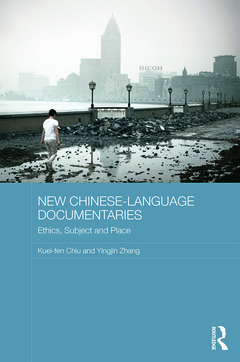Description
New Chinese-Language Documentaries
Ethics, Subject and Place
Media, Culture and Social Change in Asia Series
Authors: Chiu Kuei-fen, Zhang Yingjin
Language: English
Keywords
Chinese Independent Documentary; documentary; Yamagata International Documentary Festival; Taiwan Documentary; Chinese Language Documentaries; Moon Children; Wu Wenguang; Jia Zhangke; Ogawa Shinsuke; Taiwan Cinema; Duan Jinchuan; Taiwanese Documentary; Chinese Documentary; Documentary Filmmaking; Orchid Island; Independent Documentary; Documentary Ethics; Mainland China; Chinese Independent; Transnational Marriage; Taiwanese Business People; Women Documentarians; Great Famine; HKIFF; Immigrant Wives; Taiwanese Opera
Publication date: 11-2014
· 15.6x23.4 cm · Hardback
Publication date: 10-2017
· 15.6x23.4 cm · Paperback
Description
/li>Contents
/li>Readership
/li>Biography
/li>
Documentary filmmaking is one of the most vibrant areas of media activity in the Chinese world, with many independent filmmakers producing documentaries that deal with a range of sensitive socio-political problems, bringing to their work a strongly ethical approach. This book identifies notable similarities and crucial differences between new Chinese-language documentaries in mainland China and Taiwan. It outlines how documentary filmmaking has developed, contrasts independent documentaries with dominant official state productions, considers how independent documentary filmmakers go about their work, including the work of exhibiting their films and connecting with audiences, and discusses the content of their documentaries, showing how the filmmakers portray a wide range of subject matter regarding places and people, and how they deal with particular issues including the underprivileged, migrants and women in an ethical way. Throughout the book demonstrates how successful Chinese-language independent documentary filmmaking is, with many appearances at international film festivals and a growing number of award-winning titles.
1. Introduction: New Chinese-Language Documentaries Part 1: History and Politics 2. The History ofDocumentary Filmmaking in Mainland China 3. The Vision and Voice of New Taiwan Documentary Part 2: Theory and Ethics 4. Independent Documentary and Social Theories of Space and Locality 5. Subject to Movement: Wu Wenguang and the Ethics of Self Part 3: Subject and Gender 6. New Subjectivities in Women’s Documentary Films 7. The Other as Interlocutor: ‘Voices of the People’ in Taiwan’s Documentaries Part 4: Place and Migration 8. Empowering Place: Jia Zhangke’s Post-Nostalgic Assemblage of Shanghai 9. Migration Documentaries and the Vision of Cosmopolitanism Part 5: Exhibition and Circulation 10. YIDFF and Taiwan Documentary in the International Arena 11. The Circulation of Mainland Chinese Independent Documentary
Kuei-fen Chiu is Distinguished Professor of Taiwan Literature and Transnational Cultural Studies at National Chung Hsing University, Taiwan
Yingjin Zhang is Professor of Comparative Literature and Film Studies at the University of California, San Diego, USA and Visiting Chair Professor of Humanities at Shanghai Jiao Tong University, China
These books may interest you

Documenting the Visual Arts 209.69 €

Documenting the Visual Arts 68.19 €


